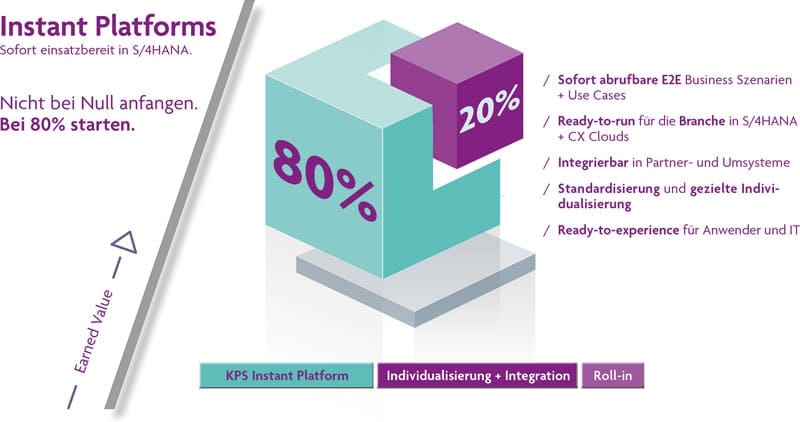Advanced color theory


At the same time as the challenge of S/4 conversion, IT specialists and SAP consultants are currently in demand on the market like never before and are therefore hard to come by. So now is the time: even with complex system and heterogeneous process landscapes, it is possible to switch to S/4 and Hana quickly.
ERP transformation projects have a reputation for being time-consuming, complex and very costly. Many existing SAP customers still remember their original implementation - associated with long descriptions of requirements in time-consuming blueprint phases that required numerous rounds of coordination in the business and often led to misunderstandings about future processes. This in turn caused costly changes to the system too late in the project. SAP knowledge had to be painstakingly built up and a stable situation often only developed months after the go-live. Not a rosy outlook for the upcoming S/4 transformation.
On the other hand, the starting situation in most companies today is much better: extensive process and SAP expertise is available in specialist departments and IT and the technology has improved significantly. It is therefore a question of using the existing knowledge in the company and the innovation potential of S/4 Hana, while at the same time seizing the opportunity to start "anew" on this basis.
Best practice processes
Three possible approaches are being discussed in the SAP world: Greenfield, Bluefield or Brownfield. The good news is that there is a fourth approach, which is based on the realization that the majority of processes are basically the same in all companies. This includes back-end processes such as invoice verification, warehousing and much more. Other processes within an industry are also comparable and require best practice, but individualizing these processes does not create a competitive advantage. Instead, it increases costs and reduces the flexibility and agility of the company. This is why these "commodity" processes in particular hold great potential for a fast, efficient and secure S/4 transformation.
Based on 20 years of experience in retail, KPS has developed platforms tailored to individual industries, the KPS Instant Platforms. The platform contains all end-to-end business scenarios for an industry with around 50 use cases in S/4 and CX cloud solutions: they can be experienced directly in the system, integrated, tested and documented in accordance with current norms and standards. The basis is the SAP standard, but some specific, customized use cases for the industry are also included.
KPS uses Signavio for visualization down to the level of individual process steps and the SAP tool Enable Now for documentation or online click instructions. The KPS Instant Platforms are available at a fixed price. As a result, customers do not start from scratch; they can call up best practices for around 80 percent of their processes on the platform immediately at the start of the project. This enables early understanding and acceptance of the new processes and tasks, even if there is no previous experience with SAP.
This allows the company to concentrate significantly more focus and available capacities on those processes during the transformation where a deviation from the standard through individualization creates real differentiation and advantages on the market. IT, process owners and power users are relieved. Depending on the company's individual starting situation, the duration of the S/4 transformation is considerably reduced, at least in those phases known to experts as blueprinting and prototyping.

S/4 conversion to run much more efficiently and with better performance.
Standardized software
What is interesting is that companies and users are really open to this approach, which is based on strong standard processes: Contrary to expectations, companies do not assume that their processes are far too individual and different to "make do" with standard software.
This is where the past helps: many of our customers either had completely individual software as a starting point or were using SAP, but were highly individualized for historical reasons. They have realized that they cannot react quickly enough to changes in the market and therefore deliberately want to remain more in the SAP standard in future. An additional aspect is "think different": in order to improve processes, it often helps those responsible to experience best practices that already exist in the system and to familiarize themselves with them. This allows them to jump straight in instead of having to go through a laborious redesign from scratch.
Individualization for differentiation
Of course, best practices and standardization are no substitute for the individual differentiation with which a company creates its USP on the market. This still requires targeted individualization - including in IT processes. Companies should first find out which processes they can use to maintain or expand their competitive advantage in the market.
These processes could be special services that complement the company's offering or a special approach to its customers. This USP must then be reflected in the right places in the company through individualization. A competent consulting partner helps to identify and implement precisely these. As a result, it is not only the quality of the "commodity" processes that increases through best practice, but also the quality of the differentiating, individualized processes.
Fast and efficient
Those responsible should therefore avoid wasting valuable resources on software customizations that do not set a company apart from the competition and instead rely on existing best practices for 80 percent of their processes.
The KPS Instant Platforms provide the basis for this. Subsequently, individualization is carried out in a targeted manner and with a sense of proportion in order to build individual competitive advantages on the proven standards. Depending on the company's existing expertise, this can be done in-house or with the help of the fixed-price packages offered by KPS for alignments or RICEFW tasks.
The Instant Platform reduces the workload of the specialist departments, but also that of the IT teams: the internal team has to keep the current system in operation and work on the project at the same time. This challenge is alleviated by the large number of ready-to-run processes already in place. As a result, the speed and efficiency of the transformation are increased, while the project and budgetary risk are reduced. The company increases the flexibility and agility of its processes and systems enormously and becomes future-compatible. Both business and IT will be able to react quickly to changes in the market or implement new business models in the future.








